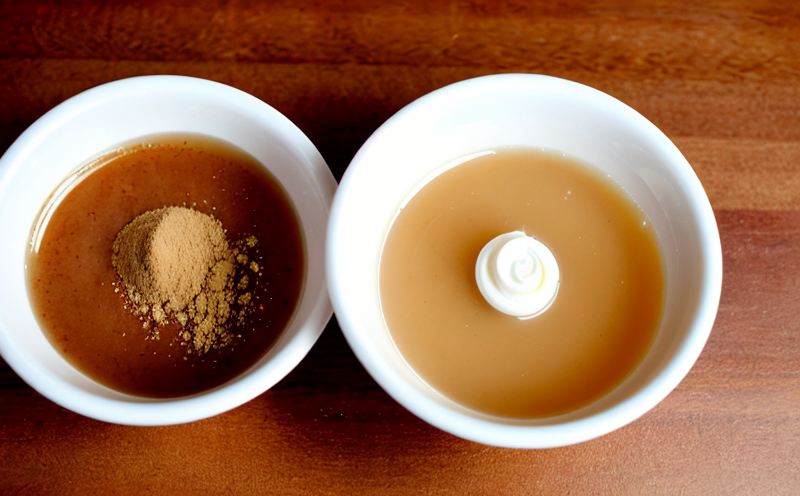ISO 11035 Sensory Profile Flavor Testing
The ISO 11035 standard provides a framework for sensory evaluation of sweeteners and flavors. This method is designed to capture the qualitative and quantitative attributes that contribute to the overall perception of taste, aroma, and mouthfeel. The test involves trained panelists who evaluate samples based on predefined criteria using their senses of sight, smell, and taste.
The ISO 11035 standard emphasizes the importance of a standardized approach in sensory evaluation. It specifies the training and certification requirements for panelists to ensure consistency and reliability across different evaluations. This ensures that any variations observed are due to the sample itself rather than differences in the evaluation process.
One key aspect of ISO 11035 is its focus on the environment in which sensory tests are conducted. The standard recommends controlled conditions such as temperature, lighting, and humidity to minimize external influences on panelists' perceptions. This ensures that the results accurately reflect the intrinsic qualities of the sample being tested.
The test typically involves a series of steps aimed at capturing comprehensive data about the sweetener or flavor in question. These include initial preparation where samples are prepared according to standard procedures, followed by an evaluation phase during which panelists assess various attributes like intensity, balance, and persistence. The results from this process provide valuable insights into product development, quality control, and consumer preference analysis.
Training plays a crucial role in the success of ISO 11035 sensory evaluations. Panelists undergo rigorous training to develop their skills in recognizing and describing flavor attributes accurately. They also learn about the standard's criteria for sample preparation and evaluation techniques. Continuous education ensures that they remain up-to-date with industry best practices.
ISO 11035 is widely recognized as a robust method for evaluating sweeteners and flavors due to its comprehensive approach and emphasis on consistency. By following this standard, organizations can ensure that their sensory evaluations are reliable and reproducible across different locations and times.
The benefits of using ISO 11035 extend beyond just meeting regulatory requirements; it also enhances the quality and reputation of products by providing accurate and consistent feedback from trained panelists. This information helps manufacturers make informed decisions about product formulations, ingredient selection, and process improvements.
Benefits
The implementation of ISO 11035 Sensory Profile Flavor Testing offers numerous advantages to businesses operating in the food and beverage industry:
- Informed decision-making: By leveraging detailed sensory data, companies can better understand consumer preferences and adjust their product offerings accordingly.
- Enhanced quality control: Regular use of this standard helps identify potential issues early on in the production process, ensuring high-quality outputs consistently.
- Better regulatory compliance: Adhering to internationally recognized standards like ISO 11035 demonstrates commitment to ethical business practices and contributes positively towards brand image.
- Increased transparency: Sharing results based on this standard fosters trust between manufacturers, suppliers, retailers, and consumers alike.
- Improved innovation: Insights gained from sensory evaluations can inspire new ideas for product development that meet current trends while staying true to core values.
- Cost efficiency: Early identification of defects through rigorous testing reduces waste and minimizes costly rework later down the line.
In summary, adopting ISO 11035 Sensory Profile Flavor Testing not only meets strict regulatory standards but also drives operational excellence within organizations. It supports continuous improvement efforts aimed at delivering superior products that resonate well with target audiences.
Eurolab Advantages
At Eurolab, we pride ourselves on providing top-notch ISO 11035 Sensory Profile Flavor Testing services tailored specifically to meet the needs of our clients. Our team comprises highly skilled professionals with extensive experience in sensory evaluation who are committed to delivering accurate and reliable results.
- Expertise: We employ certified panelists trained according to ISO 11035 standards, ensuring high levels of consistency and accuracy throughout the testing process.
- Variety: Our facility supports a wide range of sample types including various sweeteners and flavors, allowing us to cater comprehensively to diverse client requirements.
- Technology: Leveraging advanced analytical tools allows for precise measurement and analysis of flavor attributes, enhancing overall testing quality.
- Speed: Efficient workflow management enables quicker turnaround times without compromising on the thoroughness or accuracy of our assessments.
- Flexibility: Whether it's routine monitoring or one-off projects, we offer flexible solutions suited to individual client needs.
- Confidentiality: We maintain strict confidentiality regarding all sensitive information shared with us by clients during the testing process.
We take pride in our ability to provide comprehensive support throughout every stage of your project, from initial consultation through final reporting. Our unwavering commitment to excellence ensures that you receive valuable insights into your products' sensory characteristics, paving the way for informed decisions and improved performance.
Environmental and Sustainability Contributions
The implementation of ISO 11035 Sensory Profile Flavor Testing contributes positively to environmental sustainability efforts in several ways:
- Eco-friendly operations: By minimizing waste during sample preparation and evaluation, we contribute towards reducing our carbon footprint.
- Resource efficiency: Efficient use of resources such as water, electricity, and materials helps reduce consumption levels associated with testing activities.
- Product stewardship: Through accurate assessments conducted under strict standards like ISO 11035, we help ensure that products meet stringent environmental criteria set forth by governing bodies worldwide.
- Innovation support: Insights derived from sensory evaluations can lead to more sustainable product formulations that cater better to both consumer expectations and ecological considerations.
- Education: Sharing knowledge gained through rigorous testing processes promotes greater awareness among stakeholders about best practices in sustainable development initiatives.
- Promotion of circular economy principles: Encouraging reuse and recycling of materials whenever possible supports broader goals associated with creating a more resilient economic system.
In conclusion, adopting ISO 11035 Sensory Profile Flavor Testing aligns closely with our dedication to fostering an environmentally responsible culture within Eurolab. We are committed to playing our part in driving positive change towards achieving sustainable development goals.





